1493 Barcelona, History: Christopher Columbus met Queen Isabella and King Ferdinand to report on his first voyage. We have seen the steps where they greeted him.
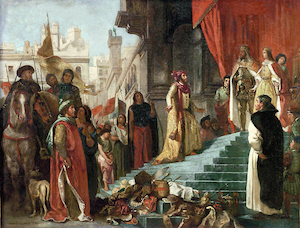
1729 Leipzig, Music: The premier of Johann Sebastien Bach’s ‘Saint Matthew’s Passion’ was at the Saint Thomas Church pictured below.
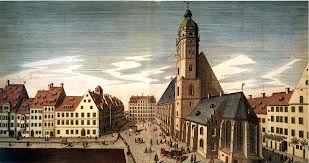
1755 London, Lexicography: Dr Samuel Johnson published the ‘Dictionary of the English Language’ in two volumes. We have a copy but not the first edition shown below.

1912 Mid-Atlantic, History: Molly Brown survived the sinking of the Titanic. Brown got into a lifeboat and took charge, hauling others abroad while keeping up a stream of invective and off-colour jokes from her days on the Colorado goldfields where her husband had made a fortune. She became ‘The Unsinkable Molly Brown.’
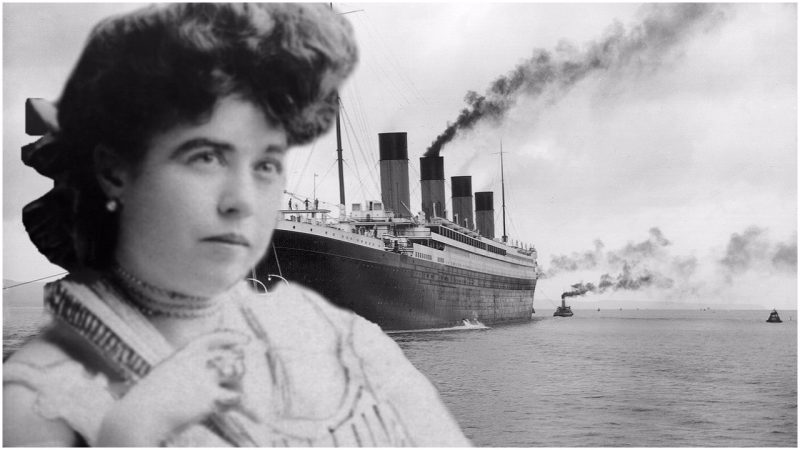
1955 Des Plaines (IA), Commerce: Ray Kroc started the McDonald’s restaurant with a simple menu, direct delivery to the customer, families welcome, and no fuss. Get it, eat it, and beat it. Rather than waiting for a made to order hamburger, they were ready to go. The alternatives were cafés/bars where families were not welcome and did not want to go, and hotel restaurants with menus in French, where tipping was essential, neckties were required, and children had to be little adults.
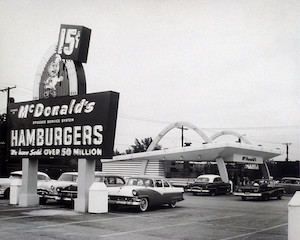
Month: March 2019
14 April
1828 Boston (MA), Knowledge: Noah Webster published the first edition of the dictionary that has since born his name with the aim of simplifying language for the new country and making it logical for mass education. Webster was careful to copyright this work. In Webster’s I have trusted over the years. A biography of Webster is discussed elsewhere on this blog.
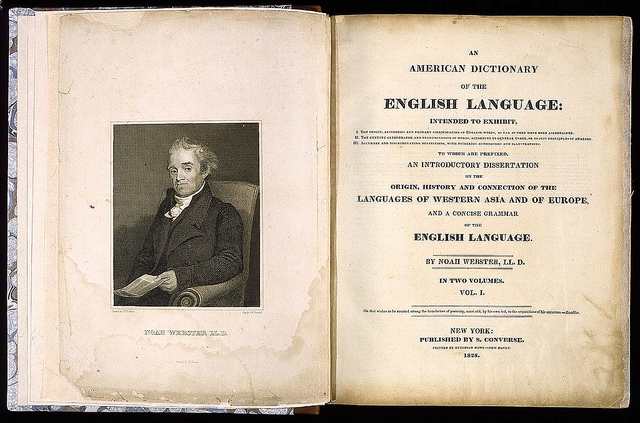
1841 Baltimore, Fiction: Edgar Allan Poe published ‘The Murders in the Rue Morgue’ which is often cited as the first detective story. August Dupin spots the inhuman hair, as Charlie Chan (‘at the Circus’ [1936]), too, did later. Dupin recurred in two more Poe stories. As a krimiologist of the first water I had to list this event.
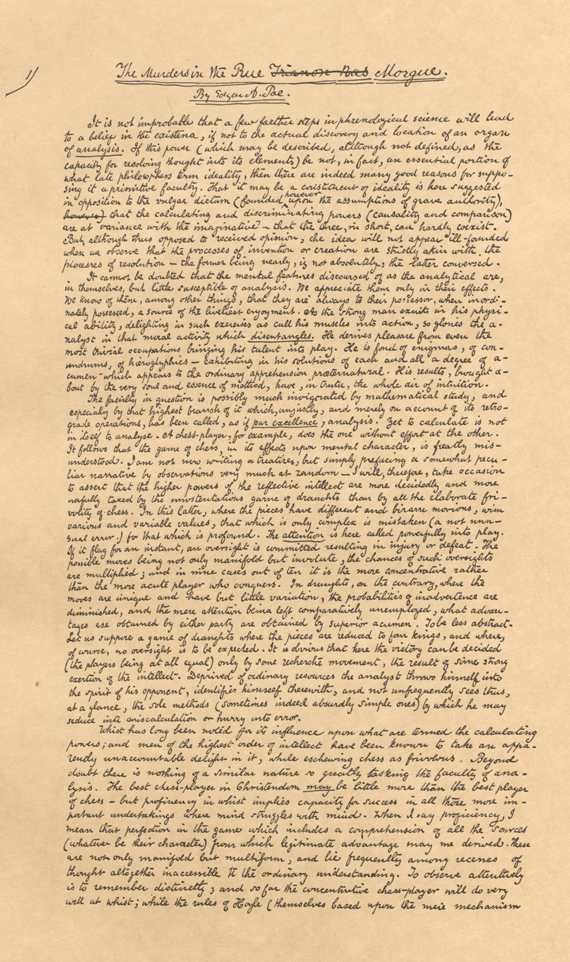
1927 Gothenberg (SV), Industry: The first Volvo automobile appeared. Ridden in a few Volvo which were once a cheap alternative to the VW Beetle, but that changed When Volvo went upmarket. I had a train ticket to Gothenbeg once but had to cancel the trip.
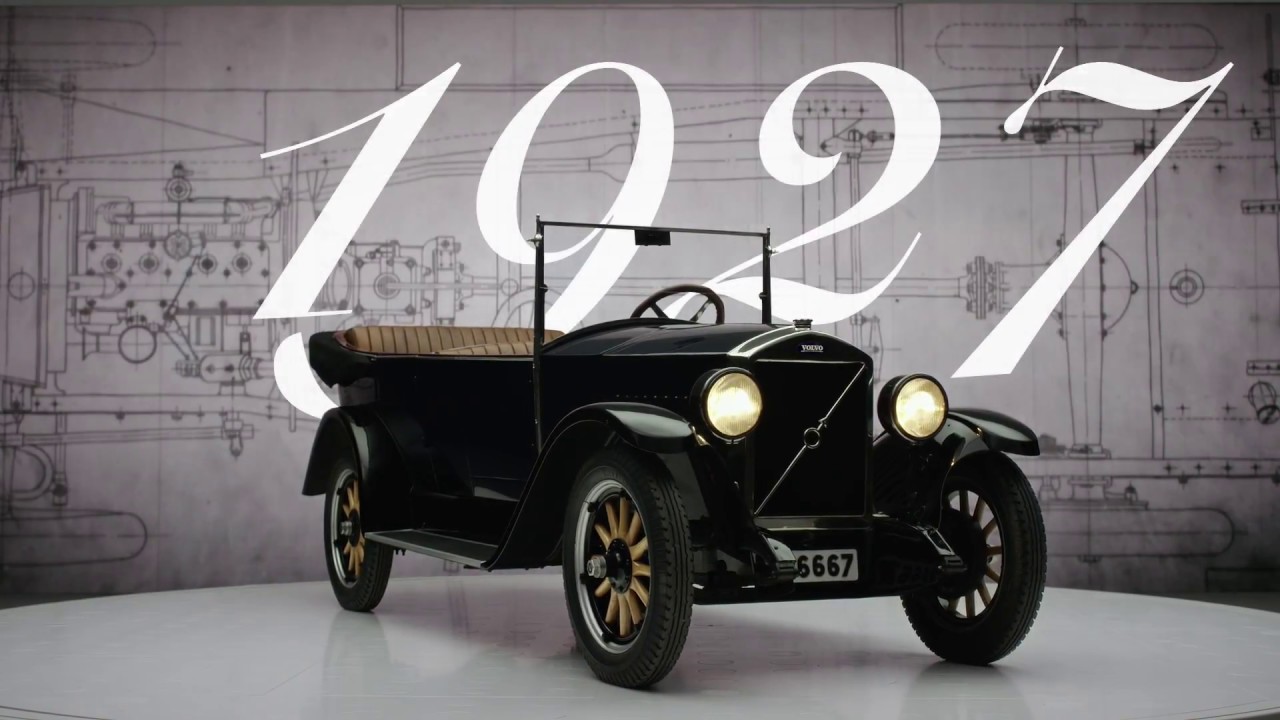
1935 Valentine (NE), Ecology: It became Black Sunday when one of the most devastating storms of the Dust Bowl struck. To many people it was apocalyptic signalling the end of days. In the midst of the Great Depression after two generations of over-farming and eight years of drought, from South Dakota, Nebraska, Kansas, Colorado, Oklahoma, Texas, and New Mexico an estimated 300 million tons of top soil was lifted in a maelstrom that lasted a week and more in some places. The skies as far away as Chicago, Boston, and New York City darkened. The Nebraska Sandhills around Valentine lost all their top soil and became what they are called today.
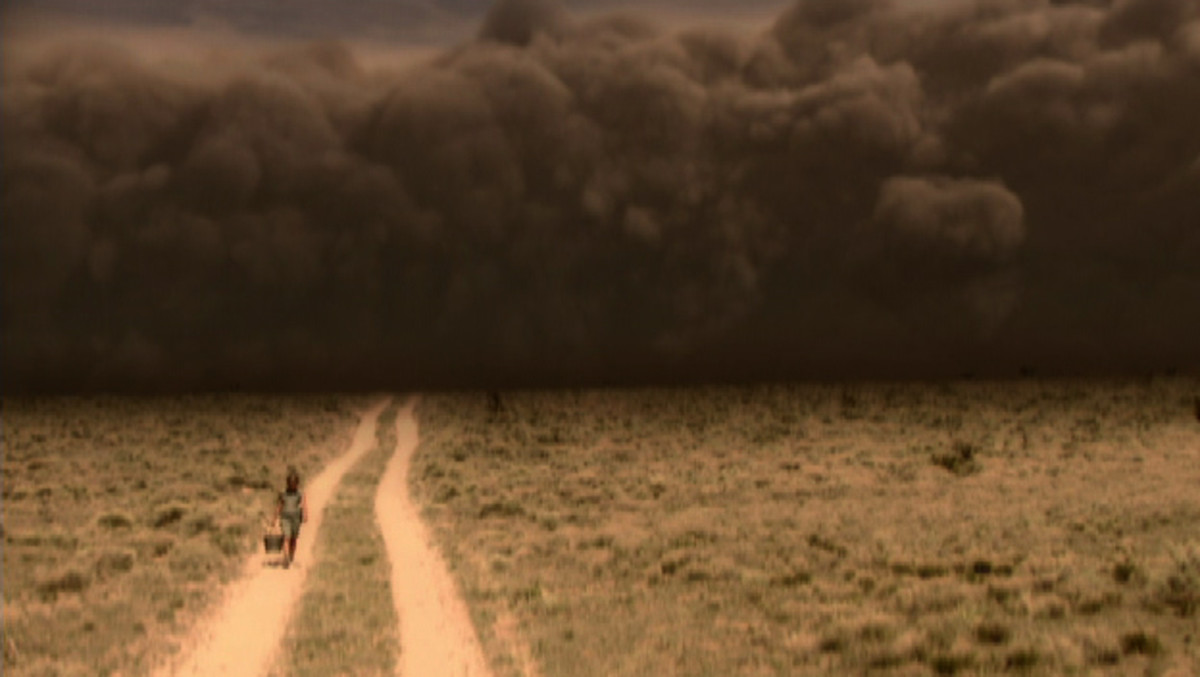
1954 Canberra, Politics: Soviet diplomat Vladimir Petrov asked for political asylum, leading to a diplomatic incident and then a split in the Australian Labor Party that insured it would not govern for twenty years. While MGB agent Petrov feared and despised Stalinism, a few kilometres across the Canberra bushland at the Australian National University Professor Manning Clark, the self-proclaimed dean of Australian historians, had rejoiced at receiving the Order of Stalin about this time. For years Petrov and his wife Evdokia hid in a Melbourne bungalow, while Clark held court. While no one ever criticises Clark, neither does any one ever read his impenetrable prose. That is justice of a sort. In the famous photograph of the time, two armed Russian agents are muscling Evdokia to a plane. When it landed in Darwin for fuel, even more armed Australian agents applied muscle to extract Mrs Petrov.
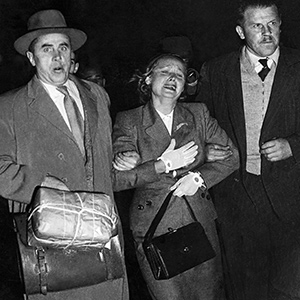
13 April
1668 London, Literature: King Charles II appointed the first poet laureate John Dryden who was a prolific translator, playwright, poet, and essayist. None of his titles registers with me but perhaps with thee.

1742 Dublin, Music: In the secular New Music Hall was the premier of Georg Handel’s ‘Messiah’ which was not intended for Christmas, but rather Easter, nonetheless it has become a Christmas ritual.
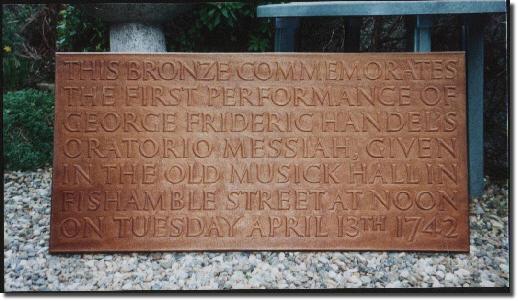
1888 Paris, Philanthropy: Alfred Nobel read an obituary of himself which condemned him for inventing TNT. It was his brother Ludwig who had died, but the obituary with the care that distinguishes journalism now as then was about Alfred, not Ludwig. Still it set him thinking….and the Nobel Prizes were the result. A study of the Nobel Prizes is discussed elsewhere on this blog.
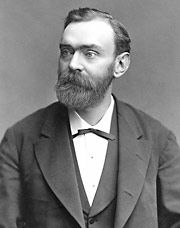
1902 Kemmerer (WY) J C Penney opened the first store which still operates. John Cash Penney negotiated volume discounts with suppliers and passed on the lower prices to customers. He also started house brands like Big Mac work clothes. In 1973 there were two thousand stores. Penney’s one of the first and few retailers to discontinue fire arms sales even in Wyoming gun country before Dick Cheney got there. Like the other high inventory retailers it has been hit hard by online rivals. One dominated Second Street in Hastings for years but has been gone for decades.
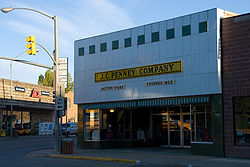
1964 Sasabe (AZ), Entertainment: Filmed on location, Sidney Poitier was awarded the best actor Oscar for the construction worker in ‘Lilies of the Field.’ He was the first black man to receive this award. When Ann Bancroft handed him the statute, she bussed him on the cheek that shocked the tiny minds and she was pilloried by many a Christian. Poitier had been a GI in World War II with a combat badge to prove it unlike so many of the tiny minds.
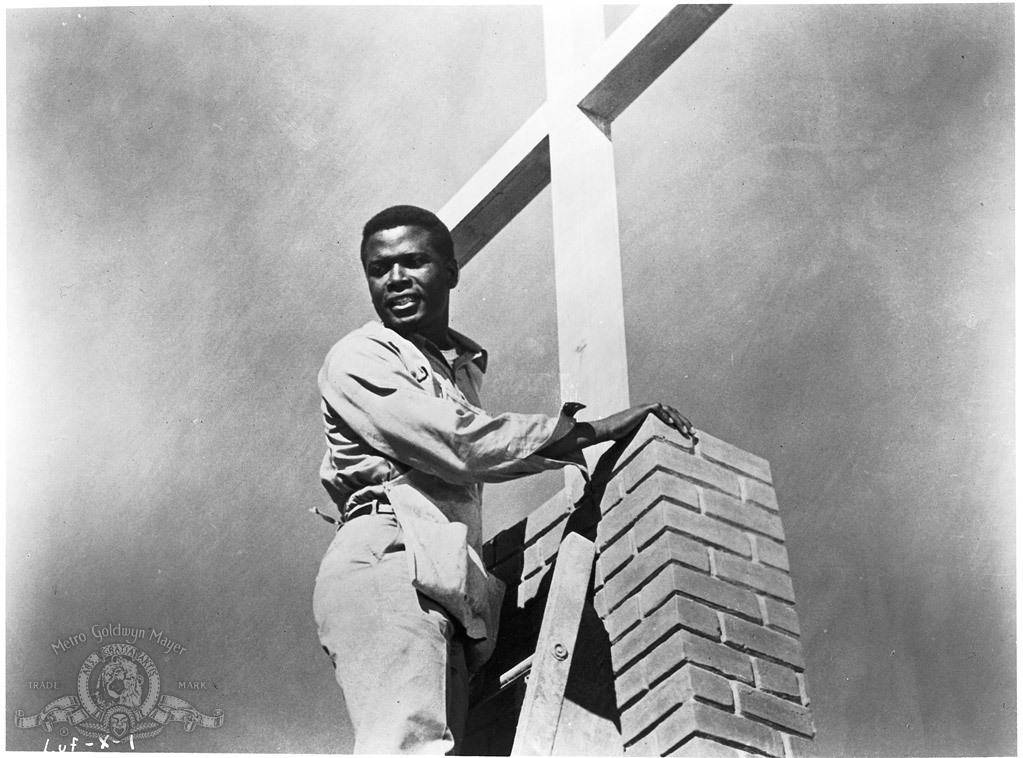
12 April
1204 The Fourth Crusade to defend Christendom and wrest the Holy Land from the Muslim infidel instead sacked Christian Constantinople. Such are the ways of the Christian. It is so much easier to murder, rape, and rob fellow Christians than go all the way to the hostile territory of Asian Minor and encounter infidels on their home turf. Then as now organised religion prefers soft targets. This episode figures in the books about Venice discussed elsewhere on this blog. We saw some of the walls on our visit to Istanbul.

1932 Culver City (CA), Entertainment: ‘I want to be alone,’ she said in ‘Grand Hotel.’ The group of mismatched stagers thrown together became standard fare in cinema. This line became totemic for at least a generation. For those who do not know who said it, well, so be it.
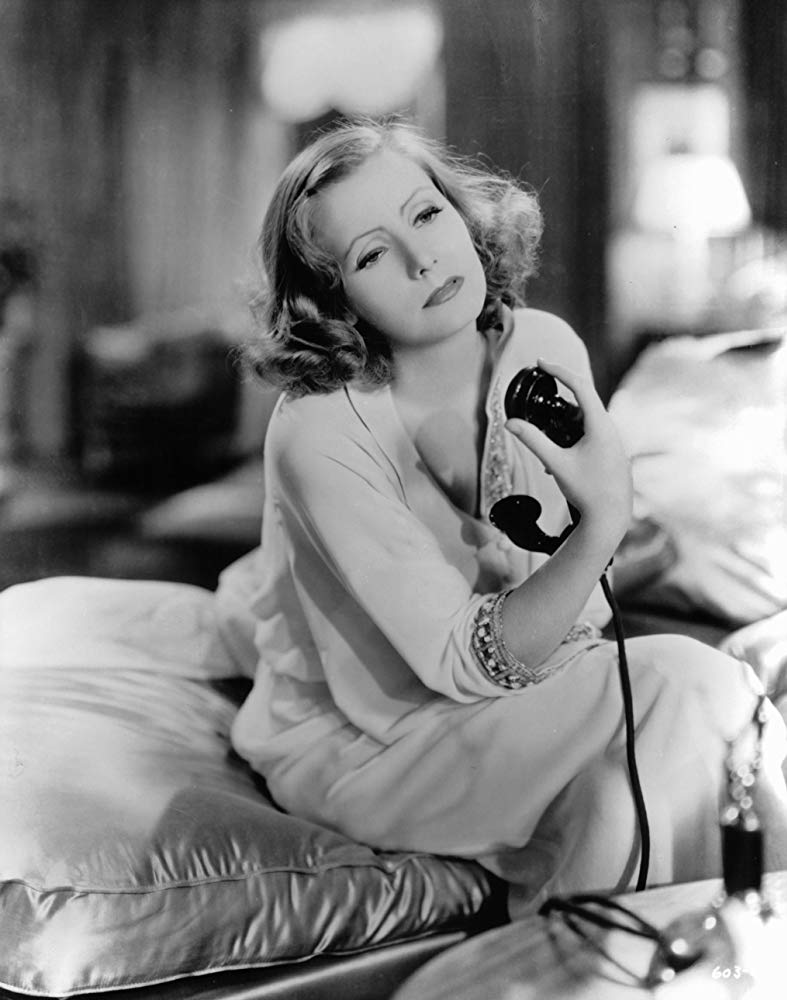
1954 New York City, Music: Bill Haley and Comets recorded ‘Rock Around the Clock’ as the B-side of a record. Since it was Side B they let rip. By a quirk of fate one bored DJ flipped the record and played the B-side as filler, and the switchboard lit-up. It went on to sell a million in one month and made it to those shores. It became the emblem of Rock and Roll music.
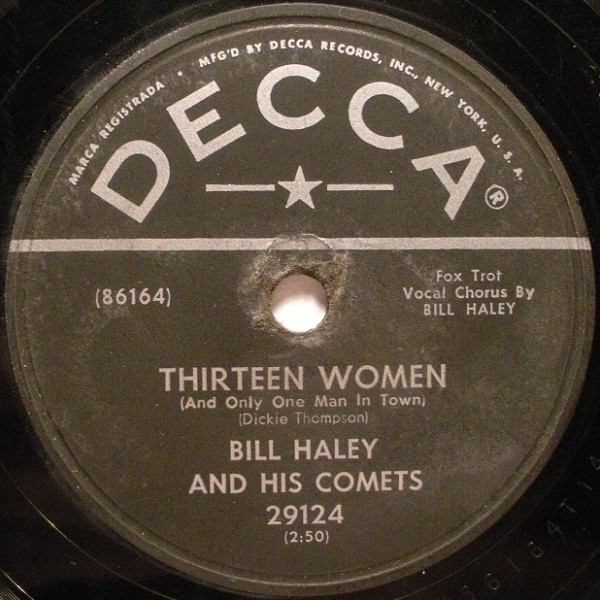
1961 Star City (USSR), Space: Yuri Gagarin became the first person in an Earth orbit. We ate at a restaurant in Moscow with his picture plastered on the walls. Below is the ignition of Vostock 1. Imagine sitting on top of that much firepower.

1981 Cape Canaveral (FL), Space: The first flight of a space shuttle, the Columbia with a crew of two, occurred. After Apollo 13 NASA concentrated on near Earth space with the shuttle program because neither Congress nor the Presidency wanted to risk a disaster en route to the moon. Ah huh.
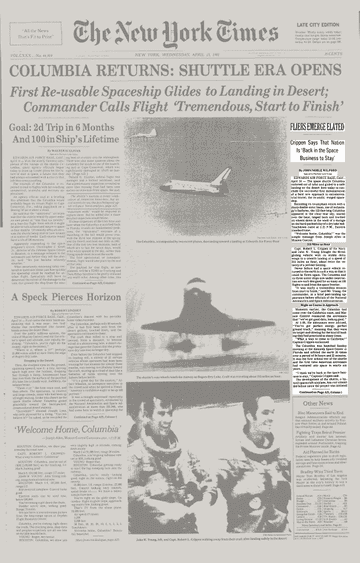
11 April
1888 Amsterdam, Music: The Koninklijk Concertgebouw was inaugurated. Been there, heard that. It is one of the most user friendly concert halls there is. Easy to get in, get around with plenty of plumbing, and get out. Plus the ticket doubles as a public transport pass for the evening and one free drink.

1890 New Jersey, History: The Ellis Island immigration station was established where as many as 12 million entered. By the way, though it lies in New York Harbour it is within the border of the state of New Jersey. Kate has seen it with her own eyes, while I have relied on ‘Brother from Another Planet,’ discussed elsewhere on this blog for my slim knowledge.
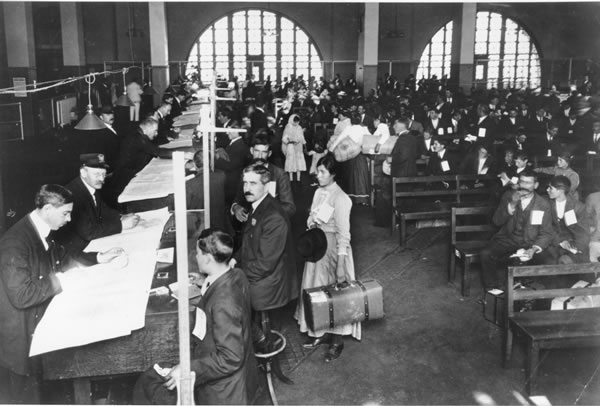
1919 Geneva, History: The International Labour Organisation was founded to promote social justice and decent working conditions, partly by setting international labour standards. It has been an agent for collective bargaining, the end of child labour, employment of women, a living wage, free labour, and the like. During World War II its executive decamped Switzerland and worked in exile at McGill University until 1948. The fear of many international organisations in Switzerland was that it would be the next victim of Naziism, or at least forced to compromise in detail with it. Indeed there was a Swiss fascist party the National Front with its partner the New Front that have now been expunged from that country’s history along with much else.

1970 Houston, Space: “Okay, Houston, we’ve had a problem here,” said Jack Swigert, later repeated by Jim Lovell, on board Apollo 13. The mapping and sample collecting mission changed to survival and re-entry. It led to a re-orientation of the space program to near Earth space with the shuttles. Below is the Apollo 13 Command Module on display at the Smithsonian, which I have seen. Some ride.
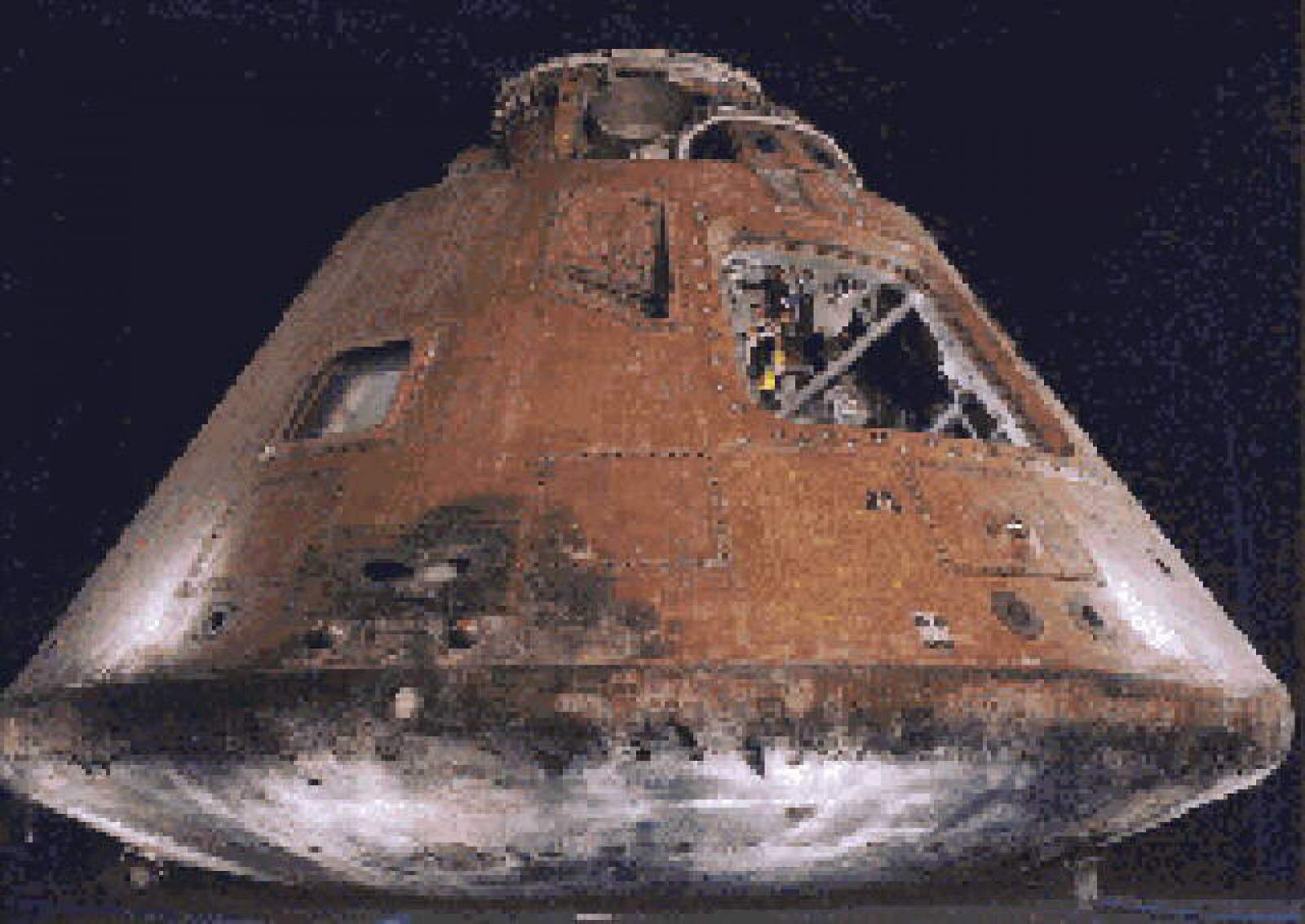
1976 The Apple 1 computer went on sale. Yes, they called is the ‘1’ because they already working on the next iteration. So like all computers, it was out of date when it went on sale. The instance below is at the PowerHouse Museum (somewhere) in Sydney. (The parentheses are because the future location of this museum remains vexed.)
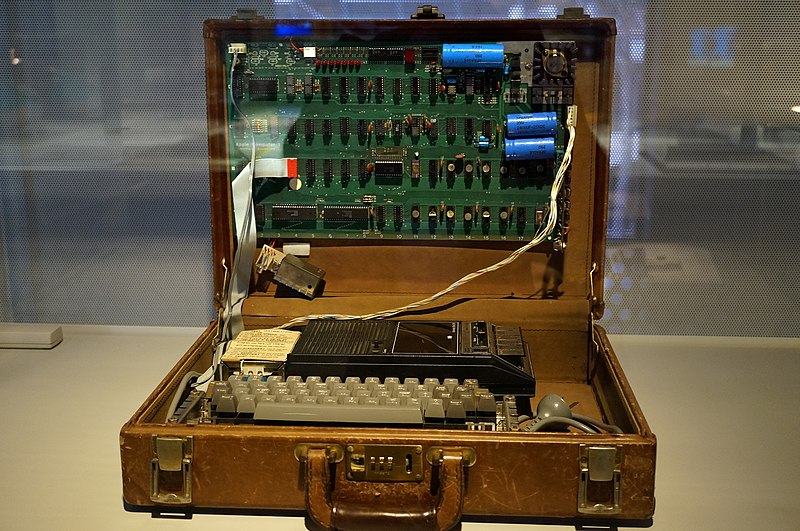
10 April
1710 London, Intellectual Property: The British parliament passed the Queen Anne Statute for the encouragement of learning by investing the creators with ownership of the work. It was one major step forward in recognising and securing intellectual property for artists, writers, and composers.
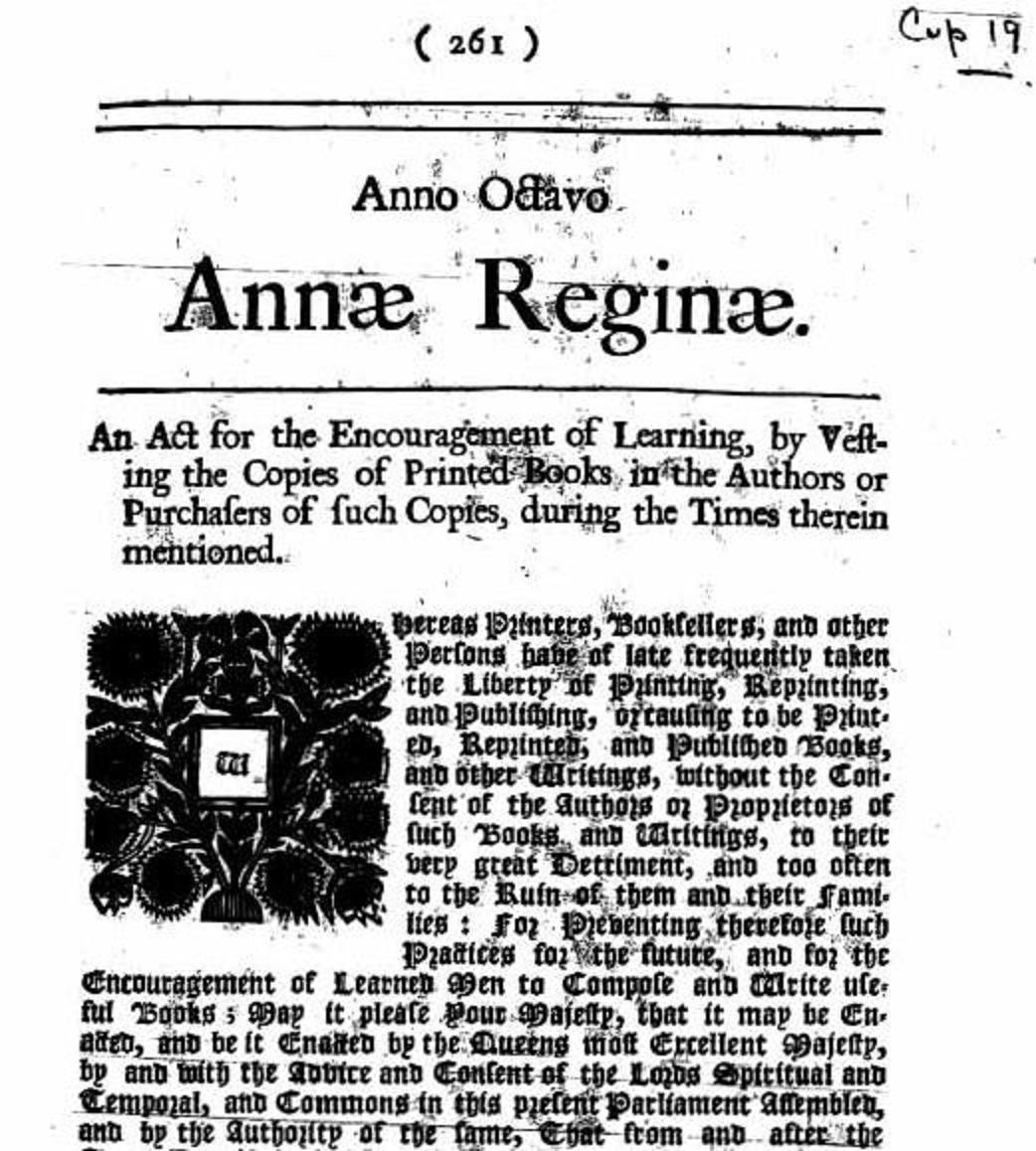
1866 New York City, Humanitarianism: The Society for the Prevention of Cruelty to Animals was founded by Henry Bergh, a retired diplomat, who plead for the ‘mute servants of mankind.’
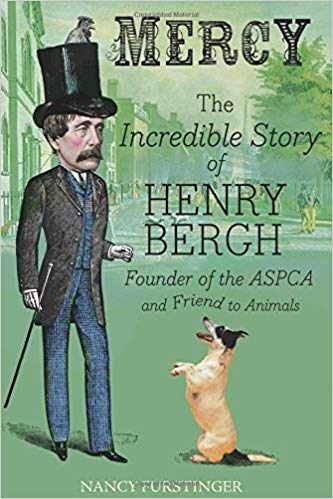
1872 Nebraska City, Ecology: The first Arbor Day which was inspired by J. Sterling Morton who, earlier as governor of the Nebraska Territory, had aspired to plant a million trees. The day was dedicated to achieving that goal. In time the day became a national celebration on the last Friday of April. If only more trees had been planted sooner perhaps the Dust Bowl would have been less disastrous. The primary school where I had a brief career in finger-painting was named for him.
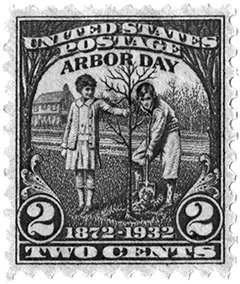
1947 Brooklyn, Sports: Jackie Robinson started at second base. At least two members of the opposing team refused to take the field with him. So began the trials. Branch Rickey had spent years looking for right man and in Mr Robinson he had found him and knew it. Today Robinson’s number 42 has been retired by all MLB teams never to be worn by another player; the only individual to be so honoured. Off the field he was a leader, as well as on.

1972 Charlie Chaplin received a lifetime achievement Oscar for his incalculable contribution to cinema. He had been hounded out of the United States in 1952 by HUAC, the beast that roamed Hollywood looking for easy headlines. Below is a still from that famous scene in ‘The Gold Rush.’
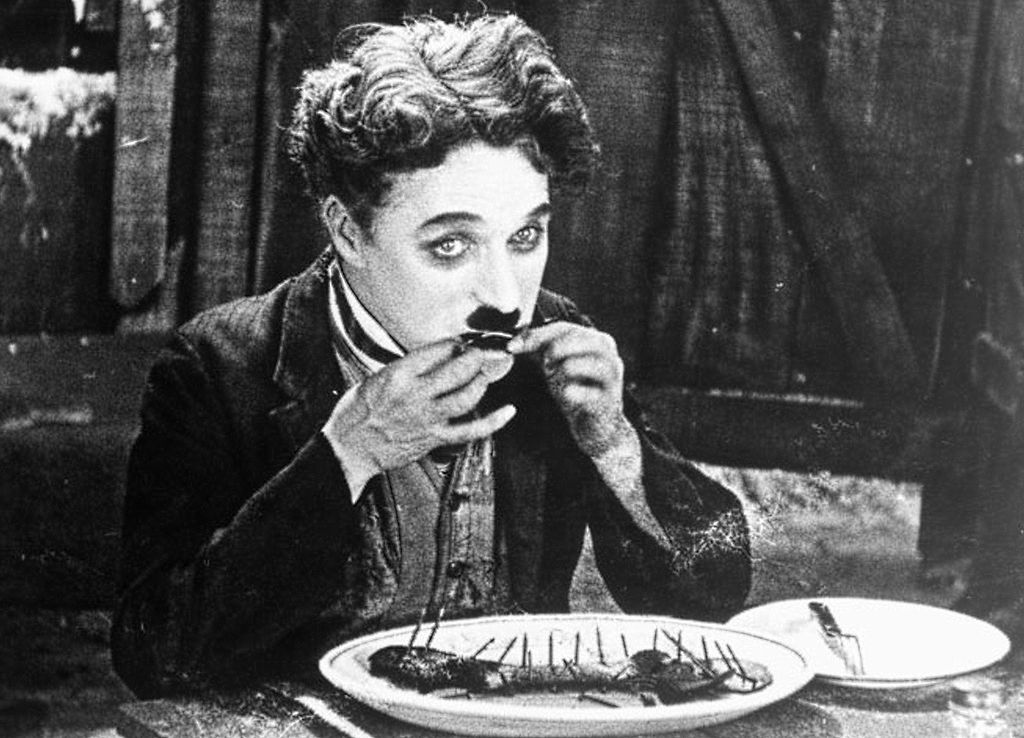
Stefan Zweig, ‘Chess Story’ (‘The Royal Game’) (1941)
Genre: Fiction, a novella
GoodReads meta-data is 104 pages, rated 4.3 by 47798 litizens

Verdict: Bleak
On a passenger ship from Europe the world chess Champion struts. After being offered a cash inducement, he agrees to play a group of passengers co-operating as a single opponent. They have nothing in common but an interest in the game and bragging rights about being beaten by the Champion. He treats them and the games they play with contempt.
Then one day in the game room for the daily humiliation, while they argue over a move, a passer-by makes a suggestion, and then another, and another. This Stranger seems to see far ahead in the game and a stalemate ensues. All are amazed, especially Champion, who however pretends to have let them draw when in fact after the Stranger’s intervention he had no way to win.
Observer questions Stranger and finds he was a victim of the Naziis who kept such sanity as he had by playing mental chess against himself for years of confinement.
Champion knows nothing but chess and is presented as some kind of idiot savant, while Stranger is an obsessive who is consuming himself. Neither is a recommendation for the game.
As is to be expected the novel starts with endgame, and moves back through opening and mid-game. There is a lot of K B-7 in it.
We saw a performance of his play ‘Beware of Pity’ and that together with our putative trip to Vienna led me to read this novella. Zweig was living in exile in Brazil when he wrote it and committed suicide shortly after this was published. Were the reviews that bad? Or was the Viennese fetish for suicide in the gene pool.
I am not inclined to seek out more Zweig. Too bleak for this good time boy.
Barbara Pym, ‘Crampton Hodnet’ (1940)
Genre: fiction
Goodreads meta-data is 216 pages rated 4.01 by 1542 litizens.
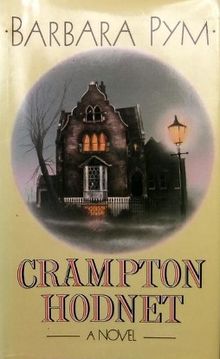
Verdict: Nothing happens and it is fascinating.
In North Oxford Miss Doggett rules the house with an iron fist in an iron glove. Her paid, but not very much, companion Miss Morrow observes life with a quiet inner smile, having learned well how to steer around Miss Doggett who does not pay her to smile.
Miss Doggett invites the new bachelor curate to lodge with them, and makes a fuss over him, expecting in return to be fussed over, too, but no. Strangely he finds the enigmatic, grey, mousy Miss Morrow of more interest. Quietly infuriated, Doggett casts around for the means to bring the curate to his senses, dimly aware that Morrow is the problem. While amused by the curate’s attention, Morrow wisely knows it will go nowhere, which it does, slowly.
Meanwhile Francis Cleveland, an irascible scholar at Randolph College in mighty Oxford University contemplates an affair with one of his students who looks at him adoringly when he recites poetry. She is flattered by his attention, until she realises his intentions! Such thoughts provide yet another in a long list of excuses for Cleveland not to do any work, and he doesn’t. In the great tradition of the English novel, including C.P. Snow, Oxbridge dons do nothing and do it very pompously. Bring on the Research Quality Framework!
There are comings and goings involving these two pairs of near-paramours, and the gossip that sightings of them kindle takes fire. Miss Doggett is there with kerosine to make sure that rectitude is rectified.
In one of the standard tropes of the era, several of the characters go off to Paris and return, chastened, once more to their routines. The curate finds a more fitting object of his desire. It is low key but so very human and humane in its delineation of character.
Pym wrote the manuscript very early in her career and it seems to have got shelved by the events of World War II and remained unpublished until 1985.
While the GoodReads rating is, for once, something that chimes with me, the summary is mistaken.
Paul Thomas, ‘Fallout’ (2014)
Genre: krimi
Goodreads meta-data 272 pages, rated 3.7 by 80 litizens.
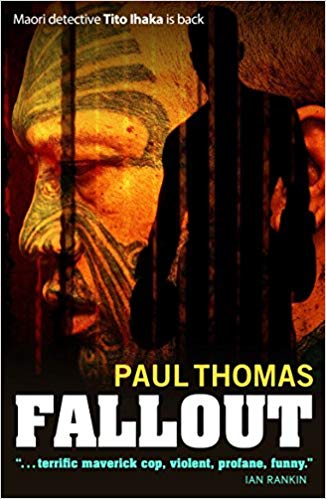
Verdict: The satire has become sanctimonious.
Maori detective Tito Ihaka is assigned a cold case by the Commissioner, who is nearing retirement and would like this one cleared up because it was the Commissioner’s first murder case many years ago and he failed to resolve it. Now he puts the impossible and impossible to stop Ihaka on the impossible case. Done right that would be enough material for the novel.
However, we have a parallel development when Ihaka learns that his father’s death years ago, attributed to a heart attack, may have been murder.
There is indeed a parallel of sorts. Ihaka finds the nouveau riche involved in the cold case a tiresome set of villains and he finds the ardent trade unionists involved in his father’s death a tiresome set of villains. I agreed on both counts: tiresome.
All the usual clichés are present, an obstructive superior, a dysfunctional home life, lying witnesses, bossy civilians, duplicitous politicians…. Nary a breath of fresh air is to be found among these clichés.
It seems, like Christopher Foyle, Ihaka is the only just man.
 Paul Thomas
Paul Thomas
I have read the first three titles in this series chronicling the investigations of Tito Ihaka in New Zealand, and I found the early titles to be whip-smart without the preaching in these pages: ‘Old School Tie’ (1994), ‘Inside Dope’ (1995), and ‘Guerrilla Season’ (1996). But in this one — written long after the previous title in the series — Thomas seems to be engaging in some social criticism about the nouveau riche or something, and nearly every page consists of backstories. The result is that movement, action, scene, development are absent. It was like reading the notes for a novel, but not the novel itself.
To über or not?
After forty plus years of cab rides, good, bad, and ugly, here at home and around the world of late I have had several rides with Uber in Sydney, Adelaide, Los Angeles, and Houston.

So far, I like the Uber experience and here is why.
The eight Uber drivers I have met do not want to talk to me. They have not told me jokes. They have not asserted opinions about passers-by, what is on the radio, or the newspaper, or life. They have not asked my opinion in order to tell me theirs.*
The cabin is silent. They do not inflict their taste in radio or CD music on me.
The cars have been clean and tidy. They are not strewn with ‘les choses de vie’ around the driver in a kind of nest.
Cash does not change hands for all is paid as a flat fee ahead of time. We all know that matter is settled.
The car comes and I can see it coming. Not the ‘first available cab’ which may mean none at all. Tricky that when going to the airport for an early flight.
No Uber driver has by word, mien, or deed, shown displeasure at a short ride. They know the ride before I get in the car.
No Uber driver has yet pitched for a tip with a certain edge. And, yes, that has happened in Sydney. See above about short rides.
None has failed the hygiene test by a nose, mine.
No Uber driver has failed to help with luggage.
Nor has an Uber driver taken the long way around for no reason.
Never has the horn been used to announce arrival.
It has been easy to get an Uber during the sacred change-over period.
My experiences are not a sample nor are they numerous, but they are authentic.
As Uber continues I expect it to converge with taxis in the same way Optus has converged on the Telecom level of service after a few years, i.e., between zero and none. So I enjoy it while it lasts.
*Despite the recurrent journalistic trope that cab drivers are in touch with the public pulse, say at election time, I have never believed it, since the ones I encounter do all the talking.
